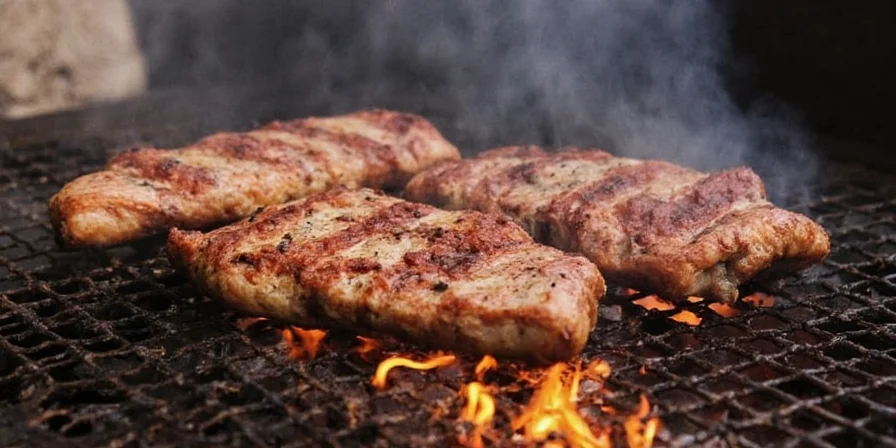Global Grilling: Spice Storage and Usage Hacks for the Perfect BBQ
Grilling is more than just a cooking method; it's an experience that brings people together. From the sizzling sounds of meat hitting the grill to the tantalizing aromas wafting through the air, the act of grilling transcends cultures and traditions worldwide. However, to truly enhance your grilling experience, you must understand the importance of spices and how to store and use them effectively. In this blog, we will explore global grilling techniques, spice storage solutions, and usage hacks that will elevate your barbecue game to new heights.
The Art of Grilling Across Cultures
Grilling is a culinary art that varies significantly from region to region. Here are a few global grilling styles:
- Asado (Argentina): This traditional Argentine barbecue involves grilling large cuts of meat, often over an open flame. The meat is typically seasoned with a simple mix of salt and may be served with chimichurri sauce.
- Yakitori (Japan): Yakitori consists of skewered chicken pieces grilled over charcoal. They are often seasoned with tare sauce or simply salted, allowing the natural flavors of the chicken to shine.
- Tandoor (India): In India, meats, and breads are cooked in a tandoor, a traditional clay oven. The intense heat creates a unique smoky flavor, often enhanced with spices like cumin, coriander, and garam masala.
- BBQ (United States): From Texas brisket to Carolina pulled pork, American barbecue is known for its diversity. Each region has its own signature rubs and sauces, often focusing on slow-cooking techniques to achieve rich flavors.
The Importance of Spices in Grilling
Spices are the heart and soul of grilling. They not only enhance the flavor of your food but also contribute to its aroma and visual appeal. Here’s why spices are essential:
- Flavor Enhancement: Spices add depth and complexity to your grilled dishes, making them more enjoyable.
- Aromatics: The right blend of spices can create irresistible aromas that entice your guests.
- Health Benefits: Many spices have antioxidant and anti-inflammatory properties, making your grilled dishes not just tasty but also healthier.
Spice Storage Solutions
Proper spice storage is crucial for maintaining the freshness and potency of your spices. Here are some effective storage solutions:
1. Airtight Containers
Invest in high-quality airtight containers to keep moisture and air from degrading your spices. Glass jars with tight-fitting lids are an excellent option. Here’s how to organize them:
| Container Type | Pros | Cons |
|---|---|---|
| Glass Jars | Durable, non-reactive, visually appealing | Can be heavy, breakable |
| Plastic Containers | Lightweight, unbreakable | Can absorb odors, may leach chemicals |
| Metal Tins | Durable, great for travel | Can rust, may react with some spices |
2. Labeling
Label your spice containers clearly. This not only helps you find your spices quickly but also keeps track of their freshness. Use a label maker or write directly on the containers with a permanent marker.
3. Cool, Dark Storage
Store your spices in a cool, dark place away from direct sunlight and heat sources. A pantry or spice drawer is ideal. Avoid storing spices above the stove, as heat can diminish their flavor.
Usage Hacks for Spices in Grilling
Once your spices are stored properly, it’s time to put them to good use! Here are some hacks to get the most out of your spices when grilling:
1. Creating Spice Blends
Experiment with creating your own spice blends tailored to your taste preferences. Here’s a simple recipe for a basic grilling spice blend:
- 2 tablespoons smoked paprika
- 1 tablespoon garlic powder
- 1 tablespoon onion powder
- 1 tablespoon brown sugar
- 1 teaspoon cayenne pepper
- Salt and pepper to taste
Mix all the ingredients in a bowl and store in an airtight container. Use this blend to season meats, vegetables, or even tofu before grilling.
2. Marinating with Spices
Marinating your meats with spices can infuse them with flavor and tenderness. Combine your favorite spices with oils, acids (like vinegar or citrus juice), and aromatics (like garlic and onion) to create a marinade. Let your proteins soak for at least 30 minutes, or overnight for maximum flavor.
3. Spice Rubs for Meats
Dry rubs are a fantastic way to apply spices directly to meats. Generously coat your protein with your spice blend before grilling, allowing it to form a flavorful crust. Here’s a simple dry rub for grilled chicken:
- 1 tablespoon paprika
- 1 tablespoon brown sugar
- 1 teaspoon cumin
- 1 teaspoon black pepper
- 1 teaspoon salt
- 1/2 teaspoon cayenne pepper
4. Infusing Oils with Spices
Infuse your grilling oils with spices to add another layer of flavor. Heat your choice of oil (like olive or vegetable oil) and add whole spices (like garlic cloves, rosemary, or chili flakes). Let it cool, strain, and use the infused oil to brush on your grilled foods or as a dipping sauce.
5. Experimenting with Global Spice Profiles
Don’t be afraid to explore spices from different cultures. Try using:
- Cumin and coriander for a Middle Eastern twist.
- Five-spice powder for an Asian flavor profile.
- Za’atar for a taste of the Mediterranean.
Conclusion
Grilling is a global pastime that connects us through shared flavors and traditions. By understanding the importance of spices and mastering the art of spice storage and usage, you can elevate your grilling experience to new heights. Explore different spice blends, experiment with marinades, and don’t hesitate to try out global flavors in your next barbecue. Happy grilling!











 浙公网安备
33010002000092号
浙公网安备
33010002000092号 浙B2-20120091-4
浙B2-20120091-4